SAARC Cultural Centre, Colombo is presenting its upcoming Fifth Session of the SAARC Talk Series 2024 on 19th June 2024 (Wednesday) at 3:00 pm (Sri Lanka Standard Time). The lecture will be delivered by Mr. Amer Bazl Khan, Director, MaritimEA Research, Karachi, Pakistan
Mr. Amer Bazl Khan will deliver his lecture on the topic “Documenting the Maritime Heritage of Pakistan”.
The presentation is open to public. To attend kindly register at the link given below.
Please click here to register
Meeting link: https://meet.google.com/xrn-jtsv-drm
Do spread the word. We look forward to your participation and engaging discussions during this enlightening lecture.
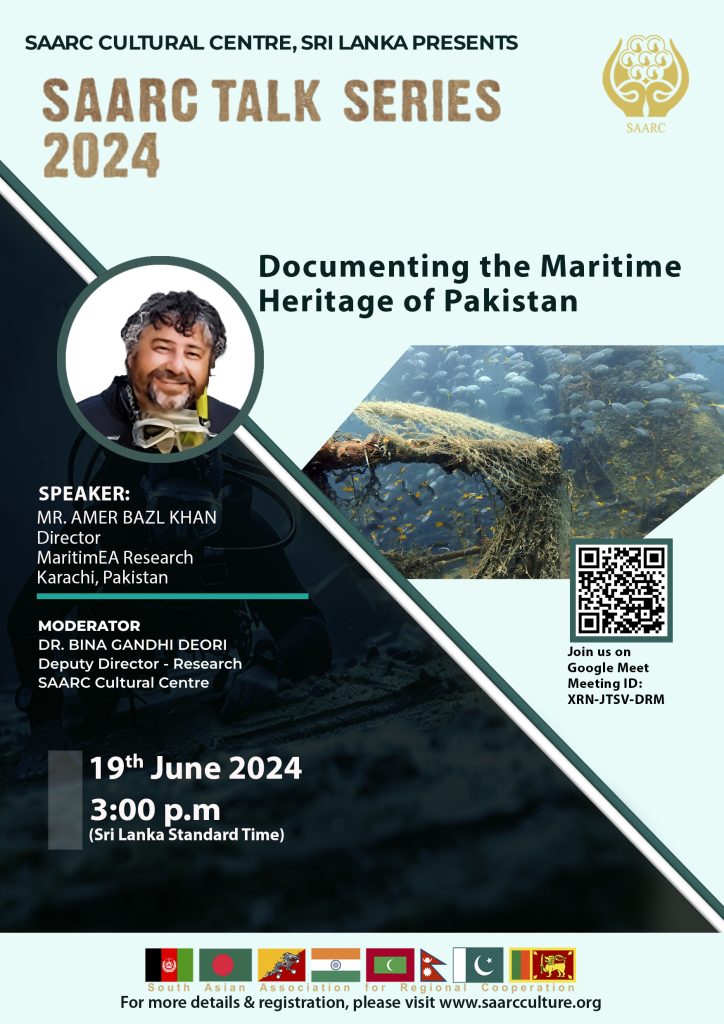
SAARC Symposium on Cultural Heritage for Sustainable Future for 2024 was approved by the Thirteenth Meeting of the Governing Board of the SAARC Cultural Centre held from 28th to 29th November 2023 and at the Fifty-Ninth Session of the Programming Committee Meeting held in Kathmandu from 6th to 7th March 2024.
Heritage, both cultural and natural has become very important in the modern world and made the world smaller via easy access to information, fast communication and international travel due to the advance of transportation systems. Tourism, local, national and global has become a significant part of the economy and this has led to heritage sites becoming very popular. This has led to hordes of tourists visiting these sites, sometimes beyond the capacity of the site and invariable leading to the damage and destruction of heritage sites. Cultural heritage sites in South Asia are a part of the religious, social and cultural lives of the population and in many cases, living heritage sites where large numbers of traditional visitors and modern tourists congregate, increased pollution, environmental degradation etc., have aggravated the issues faced by the living heritage sites. The activities associated with the heritage sites for decades, especially the Intangible Cultural Heritage (ICH) are also threatened, especially during and after the global pandemic.
In this rapidly changing world, heritage has become a centre for tourism and development of economy-based tourism disregarding the sustainability of heritage, especially the fragile and almost disappearing intangible cultural heritage. This has led to intangible cultural heritage becoming a tourist-oriented commodity with the social, cultural and religious values associated with, disappearing from communities and culture. This symposium is planned to address these issues and to preserve heritage and heritage values while ensuring the economic and social benefits are shared among local communities.
The symposium will be for two (2) days followed by one (1) day cultural tour. Papers for the symposium will be invited from academics from universities, institutes, independent researchers, heritage practitioners, etc., from the honoured Member States.
The SAARC Symposium aims to address the following research questions:
2.1. How can heritage conservation contribute to sustainable development goals in the SAARC Region?
2.2. In what ways can heritage be used to promote Regional Unity?
2.3. What measures can be taken to ensure the preservation of heritage sites amidst increasing tourist activities?
2.4. How can communities balance the need to preserve ICH practices while adapting to modern challenges and changes?
2.5. In what ways can indigenous communities be empowered to share their knowledge for sustainable development initiatives?
2.6. What strategies can be implemented to mitigate the effects of climate change on heritage conservation?
2.7. How has social media transformed the way we interact with cultural heritage?
The main objectives of the SAARC Symposium are as follows:
3.1. To create a platform to bring together interdisciplinary Regional professionals to discuss key issues and debates relating to the protection of heritage for a sustainable future;
3.2. To identify ways in which communities can actively participate in sustainable development initiatives while preserving their cultural heritage;
3.3. To promote Regional Unity through intercultural dialogue;
3.4. To examine the benefits and drawbacks of heritage tourism for local communities;
3.5. To investigate the effective ways to safeguard and transmit ICH practices to future generations;
3.6. To examine how indigenous knowledge systems can promote sustainable living practices;
3.7. To explore how social media platforms can be utilised to engage diverse audiences in heritage-related discussions.
3.8. To bring out publication in the form of the Book of Abstracts of Cultural Heritage for Sustainable Future.
The SAARC Symposium will be a blend of theoretical discussions and practical case studies, making it an enriching and interactive experience for the participants.
4.1. Speakers will do oral presentations to share their expertise and insights on the subject.
4.2. Assign session chairs to introduce speakers, manage Q & A sessions and ensure the smooth flow of the symposium.
4.3. Virtual options will be available for those participants unable to attend physically.
The expected outcomes of the SAARC Symposium are the following:
5.1. Identify challenges and opportunities in balancing cultural preservation with sustainable development practices.
5.2. Creation of new partnerships and collaborations between organizations working in the fields of culture, heritage and sustainability within the SAARC Region.
5.3. Dissemination of best practices, case studies and research findings within the SAARC Region through the publication of papers presented at the Symposium and uploading them online at the SAARC Cultural Centre website for free global access.
6.1. Heritage and Sustainable Development
Heritage and sustainable development go hand in hand. Preserving heritage is vital for sustainable development as it provides a connection to the past and paves the way for a better future. By integrating heritage conservation into development strategies, we can ensure the longevity of both tangible and intangible heritage for future generations. For this session, we seek contributions that illustrate this interconnectivity between Heritage and Sustainable Development.
6.2. Heritage and Peace
Heritage has the power to build bridges and foster understanding among different communities. By promoting mutual respect and understanding for heritage, conflicts can be reduced and a more peaceful and inclusive society can be created. For this session, we are looking for papers that illustrate how heritage can play a crucial role in promoting peace and harmony.
6.3. Heritage Tourism
Heritage Tourism has become increasingly popular in recent years as it offers an opportunity to showcase cultural heritage and provides economic benefits to the local communities. In this session, we seek papers that address how promoting responsible tourism practices, heritage sites can be preserved for future generations.
6.4. Intangible Cultural Heritage (ICH) Practices for Communities
ICH practices play a significant role in shaping the identities of communities. By recognizing and safeguarding ICH practices, we can foster a sense of pride and belonging among communities. In this session, we seek papers that illustrate how, by safeguarding and promoting these practices, communities can maintain their cultural continuity.
6.5. Indigenous Knowledge for Sustainable Development
Indigenous knowledge has proven to be a valuable resource for sustainable development, especially in the face of environmental challenges. In this session, we encourage research papers that show how incorporating indigenous wisdom into development plans, we can promote a more harmonious relationship between humans and the environment.
6.6. Heritage and Climate Change
Climate Change poses a significant threat to heritage sites. Rising sea levels, global warming. etc. pose a significant threat to our heritage sites. In this session, we welcome papers that address the impact of climate change on heritage and how we can work towards developing adaptive strategies to protect these valuable assets for future generations.
6.7. Role of Social Media for Heritage
In the digital age, social media has emerged as a powerful tool for promoting heritage. Social media platforms have transformed the way we engage with heritage. In this session, we seek papers that explore the role social media plays in raising awareness in preserving heritage resources.
7.1. Officially Nominated Participants from the Member States
The SAARC Cultural Centre invites all Member States to send a maximum of Five (5) Official Nominations of experts working on the abovementioned theme from their respective countries for the SAARC Symposium. The participants may be selected from diverse disciplines among academics and policy-makers including but not limited to archaeologists, art historians, conservators, curators, museologists, anthropologists, sociologists, and heritage site managers. The SAARC Cultural Centre would provide local hospitality (Hotel accommodations on a full board basis) and local transport to all Official Nominees of the SAARC Member States.
7.1.1. The airfare of the Official Nominees of the SAARC Member States is to be borne
by the respective Member States.
7.1.2. The Host Member State can nominate a maximum of 15 Official Nominees. All Official Nominees of the Host Member State will be invited to participate in the Cultural Tour and provided with the symposium kit. Official Nominees from the Host State will be provided with accommodation if required depending on the availability of the budget.
7.1.3. All Official Nominees must present a paper at the symposium.
7.2. Other Participants from the Member States
Category A
7.2.1. The SAARC Cultural Centre would also accept the participation of other experts from the Member States (other than the Official Nominees of the respective SAARC Member States).
7.2.2. Applications should be sent through the respective Ministry of Foreign Affairs/Ministry of External Affairs to the SAARC Secretariat.
7.2.3. The selection of Other Participants (Category A) will be at the discretion of the SAARC Cultural Centre based on the availability of space and the relevance of the abstract to the symposium themes.
7.2.4. Air Travel is to be borne by the participant and SCC will provide accommodation (depending on availability), Symposium kit and the cultural tour.
Category B
7.2.5. Participants from the Host Member State (the Republic of India) where the symposium is held can participate. (It is anticipated that researchers, academics, etc., from the host city will present papers at the symposium).
7.2.6. Other Paper Presenters (Category B) from the Host Member State (the Republic of India) will not be provided with travel and accommodation.
7.2.7. Other Paper Presenters (Category B) will receive the symposium kit and meals during the symposium.
7.2.8. Virtual Participants -Participants unable to attend the symposium physically can join virtually.
7.2.9. Officials of the SAARC Cultural Centre-The Director, Deputy Director-Research (officiate the symposium) and two other officials from SCC will attend this event.
7.3. Additional Information
7.3.1. Registration Forms of all participants (Official Nominees, Other Participants Category A and B) must be received through the respective Ministry of Foreign Affairs/Ministry of External Affairs of the Member State to the SAARC Secretariat.
7.3.2. The Language of the symposium is English. All abstracts and presentations should be in English.
7.3.3. The SAARC Cultural Centre reserves the right to select the Other Participants (in Category A and B) for the symposium.
7.3.4. The symposium facilities (delegate kit, tea, working lunch) as well as invitations to special events and the field trip would be extended to all participants.
7.4. Nomination Process
7.4.1. The Official Nominees will be selected by each Member State comprising leading academics, archaeologists and other experts from the Member States. Official Nominations should be submitted to the SAARC Secretariat, with the Registration Form (Annexure 1) and the Format for the Submission of State Papers/Abstracts (Annexure 2) attached (or downloaded from the SCC website) and the details requested below.
7.4.2. All Other Participants (Category A) from each Member State should forward their information (including Annexure 1 & Annexure 2) through the respective Foreign Ministries to the SAARC Secretariat in Kathmandu.
7.4.3. An advance copy can be emailed to sccpublications@gmail.com or dd-research@saarcculture.org.
7.5. All Participants should include:
7.5.1. Full Name and Affiliation of the Person and other details requested in the Registration Form attached herewith. (Registration Form – Annexure 1)
7.5.2. Detailed CV of the participant.
7.5.3. Scanned copy of Passport / Scanned copy of National Identification from the Participants of the Host Member State.
7.5.4. An Abstract (350 words) of the proposed paper. The Abstract should be submitted in the Submission Form attached herewith. (Format for the Submission of Abstracts-Annexure 2)
7.5.5. The participants are requested to submit their full papers by 20th August 2024 and prepare a PowerPoint Presentation of 15 minutes maximum to be presented during the SAARC Symposium.
7.6. Time Schedule for the Symposium Paper Submissions
Call for Papers 1st May 2024
The deadline for accepting Nominees & Participants 30th June 2024
Selection of Abstracts & Informing Participants 20th July 2024
Submission of full papers to be published before the symposium 20th August 2024
Symposium and Cultural Tour Dates (TBA) October 2024
(TBA)October 2024
India
Dr. Bina Gandhi Deori
Deputy Director (Research)
Email: dd-research@saarcculture.org
Download PDF Documents : Annexure 1 & Annexure 2
Download Word Document : Annexure 1 & Annexure 2
SAARC Research Project Grants on Intangible Cultural Heritage for Food Storage in the SAARC Region was approved by the Thirteenth Meeting of the Governing Board of the SAARC Cultural Centre held from 28th to 29th November 2023 and at the Fifty-Ninth Session of the Programming Committee Meeting held in Kathmandu from 6th to 7th March 2024.
The Research Grants provide an opportunity for scholars, and researchers to conduct in-depth studies on traditional food storage/preservation practices used by different cultures within the SAARC Region. By studying these practices, we hope to better understand their effectiveness and potential for modern-day applications and environmentally friendly and chemical-free food.
The Research Grants will provide an opportunity for the Member States to explore new research areas along the intangible cultural heritage for food storage/preservation practices in the SAARC Region. Research findings can help the integration of these traditional practices into modern-day food storage/preservation systems for a more sustainable future.
Research and documentation of these traditional storage/preservation practices as intangible cultural heritage can contribute to the preservation of cultural diversity, promote sustainability, enhance food security and potential economic benefits for the local communities. This will help in preserving the cultural identity of traditional food storage and preservation, and promote diversity and understanding within the SAARC Region.
The Research Grant aims to address the following research questions:
2.1. What are the benefits of preserving traditional food storage/preservation and intangible cultural heritage for future generations?
2.2. How can traditional knowledge and modern technology be integrated to develop more efficient and sustainable food storage/preservation practices in the SAARC Region?
2.3. How can the traditional food storage/preservation methods contribute towards sustainable environments?
2.4. What are the key challenges regarding traditional food storage/preservation in the SAARC Region and how can these challenges be addressed to prevent food waste and improve food security?
2.5. How can the impact of modernization and globalization on traditional food storage/ preservation practices be changed?
Through the Research Grants, the SAARC Cultural Centre aims to:
3.1. Encourage new research in the field of traditional food storage/preservation practices in the SAARC Region;
3.2. Facilitate new approaches to study traditional food storage/ preservation practices and explore ways to revive and preserve endangered food storage/ preservation practices;
3.3. Present innovative measures for the conservation and preservation of traditional food storage/preservation practices;
3.4. Identify the challenges and threats communities face in preserving the traditional food storage/preservation practices and how can they overcome them.;
3.5. To bring out the publication of the Research Final Reports and to be uploaded to the SAARC Website for free global access.
The SAARC Cultural Centre invites academics and researchers from Member States to submit detailed Research project proposals (along with a detailed budget breakdown for US$ 3,000) for new and innovative short-term research projects on the ICH and Traditional Food Storage in the SAARC Region.
The selection of research project proposals will be carried out by a Team of Experts selected by the SAARC Cultural Centre. The first instalment of the grant (US$ 1500) will be made at the commencement of the Research Project. The final payment is subject to the review of the final presentation made to a team of experts via video conferencing and submission of the final research paper. Any suggestions/recommendations made by the SCC Team of Experts at this stage are to be included in the research process by the respective researchers.
Each researcher will be required to submit a Research Report on Academic Research quality to be published in the “ICH and Traditional Food Storage Practices in SAARC Region” publication series of the SAARC Cultural Centre.
5.1.Traditional Techniques and Knowledge of Food Storage/Preservation
The traditional techniques of food storage/preservation have been developed over centuries to preserve food for a longer period. These techniques vary from region to region like smoking, drying, pickling, fermenting etc. This session seeks contributions that explore the different methods of food storage/preservation practised in the SAARC Region.
5.2.Intersections of Food Storage/Preservation Practices with Cultural Identity and Heritage
Food storage/preservation practices are deeply intertwined with cultural identity and heritage preservation. This session encourages papers that reflect the values, beliefs and traditions of a community, making them an integral part of cultural heritage.
5.3.Oral Traditions Related to Food Storage/Preservation Methods
Oral traditions related to food storage/preservation methods are an integral part of cultural heritage. This session welcomes papers exploring the oral traditions that give insight into the cultural significance of food storage/preservation practices and their role in the community.
5.4.Sustainability and Resilience of Traditional Food Storage/Preservation Practices in the Modern World
Traditional food storage/preservation practices have stood the test of time and have proven to be sustainable and resilient in the modern world. This session seeks contributions that highlight these aspects of traditional food storage/preservation practices.
5.5. Gender Roles and Traditional Food Storage/Preservation
Gender roles have a significant impact on traditional food storage/preservation practices. In many cultures, women are responsible for processing and storing food. In this session, we seek contributions that address the division of labour that has resulted in different techniques and methods of food storage/preservation.
5.6. Revival and Preservation of Endangered Food Storage/Preservation Practices
There is a recent trend of revival of these practices due to their cultural significance and sustainability. Efforts are being made to preserve and promote endangered food storage/preservation practices to keep their cultural heritage alive. In this session, we welcome papers that examine the role played by various organizations and communities to preserve and promote endangered food storage/preservation practices.
5.7. Community-based Approaches to Safeguarding Intangible Cultural Heritage Related to Food Storage/Preservation
The community-based approach to safeguarding intangible cultural heritage related to food storage/preservation is crucial for preserving these practices. Organisations and communities are coming together to document and promote traditional food storage/preservation practices. This session welcomes papers that explore active community participation in knowledge sharing.
6.1. Academics, Scholars and Researchers of the SAARC Member States.
6.2. Academics, Scholars and Researchers who have received Research Grants from the SAARC Cultural Centre previously within the last 5 years will not be eligible.
7.1. Format for the Application is attached herewith as Annexure-1 (to be filled for both Seminar and Research Grant and Annexure-3 (to be filled only for the Research Grant) and available at the SAARC Cultural Centre website. (www.saarcculture.org).
7.2. All sections of the application are to be completed (Part- A, B and C). Incomplete applications will not be considered.
7.3. Each Member State can forward any number of Research Proposals for consideration.
7.4. Research Proposals should be for innovative and new research based on the themes mentioned above or on a new theme related to Intangible Cultural Heritage for Food Storage in the SAARC Region.
7.5. Application forms must be channelled through the respective Ministry of Foreign/External Affairs of the Member States and the SAARC Secretariat to SCC.
7.6. An advance copy can be emailed to the SAARC Cultural Centre- sccpublications@gmail.com or dd-research@saarcculture.org
7.7. All Research Proposals should reach the SAARC Cultural Centre by 20th June 2024.
7.8. The Research Grant will be distributed in 2 instalments – The first instalment (US$ 1500) at the commencement of the project and the final instalment (US$ 1500) after the submission of the Final Report.
7.9. The final payment is subject to the review of the final presentation made to a Team of Experts via Video Conferencing and submission of the final research paper. Any suggestions/recommendations made by the SCC Team of Experts at this stage should be included in the research process by the respective researchers.
7.10. At the end of the Research Project each researcher will be required to submit a research report of academic research quality.
Deadline for Accepting Research Proposals – 20th June 2024
Selection of Research Proposals – 30th June 2024
Commencement of the Project – 10th July 2024
Mid-Term Review of the Research to the Team of Experts – (TBA) October 2024
Final Report – 20th December 2024
Dr. Bina Gandhi Deori, Deputy Director (Research)
Email: dd-research@saarcculture.org/sccpublications@gmail.com
Download PDF Documents : Annexure-1 & Annexure-3
Download Word Document : Download
SAARC Cultural Centre, Colombo is presenting its upcoming Third Session of the SAARC Talk Series 2024 on 13th March 2024 (Wednesday) at 3:00 pm (Sri Lanka Standard Time). The lecture will be delivered by Mr. Samten Yeshi, Researcher, VAN MANEN Project, Leiden Institute for Area Studies, Leiden University, The Netherlands.
Mr. Samten Yeshi will deliver his lecture on the topic “The Relationship between Culture and Nature: A Bhutanese Perspective”.
The presentation is open to public. To attend kindly register at the link given below.
Please click here to register
Meeting link: https://meet.google.com/wps-jzsc-eam
Do spread the word. We look forward to your participation and engaging discussions during this enlightening lecture.
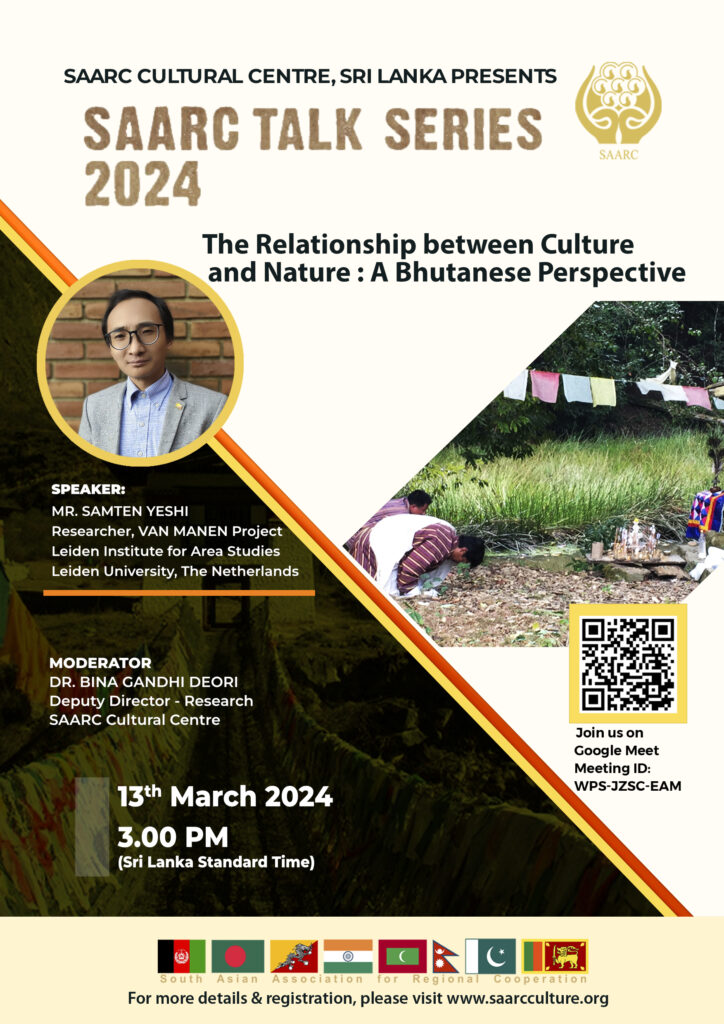
Sri Lanka India Society, Colombo organized a commemorative dinner to celebrate the 77th Indian Independence Day on the 23rd September 2023 at the Taj Samudra. Prime Minster of Sri Lanka Hon. Dinesh Gunawardena was the Chief Guest of the event. Director of the SAARC Cultural Centre Mrs Renuka Ekanayake delivered the keynote address. In her speech, Ms. Ekanayake highlighted the historical links between Sri Lanka and India and how these links over the centuries have cemented the bonding between the two countries. In her speech she also thanked Mr. Kishore D Reddy, President, SLIS for the kind invitation.
His Lordship Chief Justice Hon. Jayantha Jayasuriya, High Commissioner of India to Sri Lanka H.E Gopal Baglay, Attorney General Hon. Sanjay Rajaratnam, Hon. Minister Manusha Nanayakara, Governor of the Eastern Province Hon. Senthil Thondaman, Deputy High Commissioner Dr Satyanjal Pandey and Member of Parliament Hon. Yadamini Gunawardena, graced the occasion. Dr Bina Gandhi Deori, Deputy Director-Research, SAARC Cultural Centre also attended the event among other dignitaries.
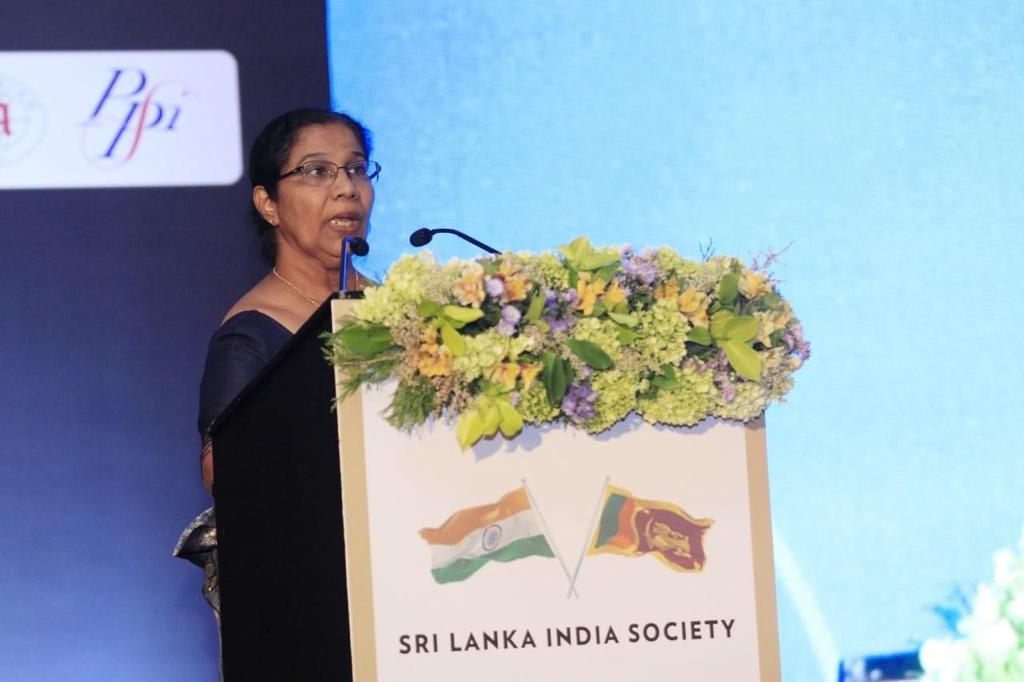
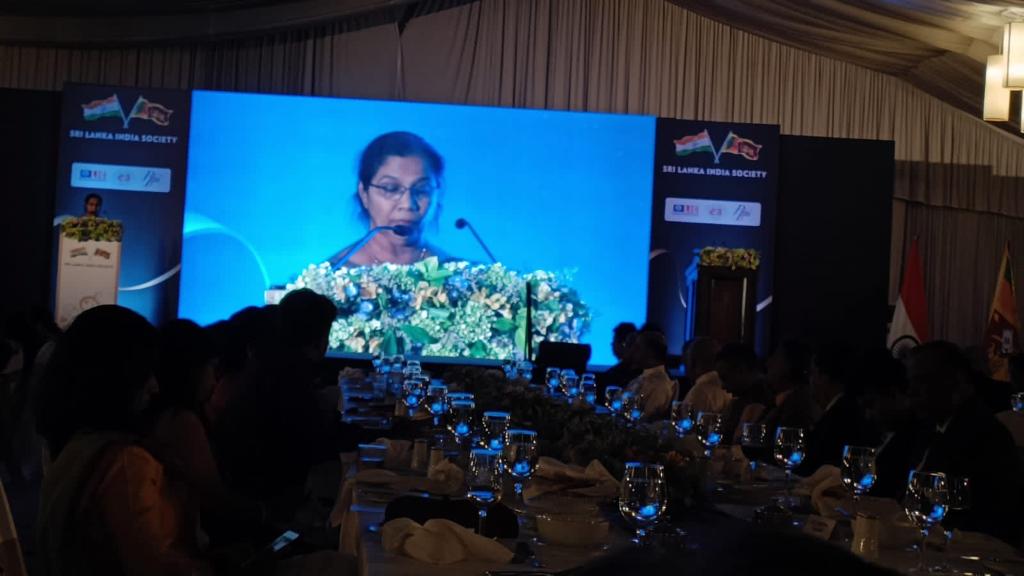
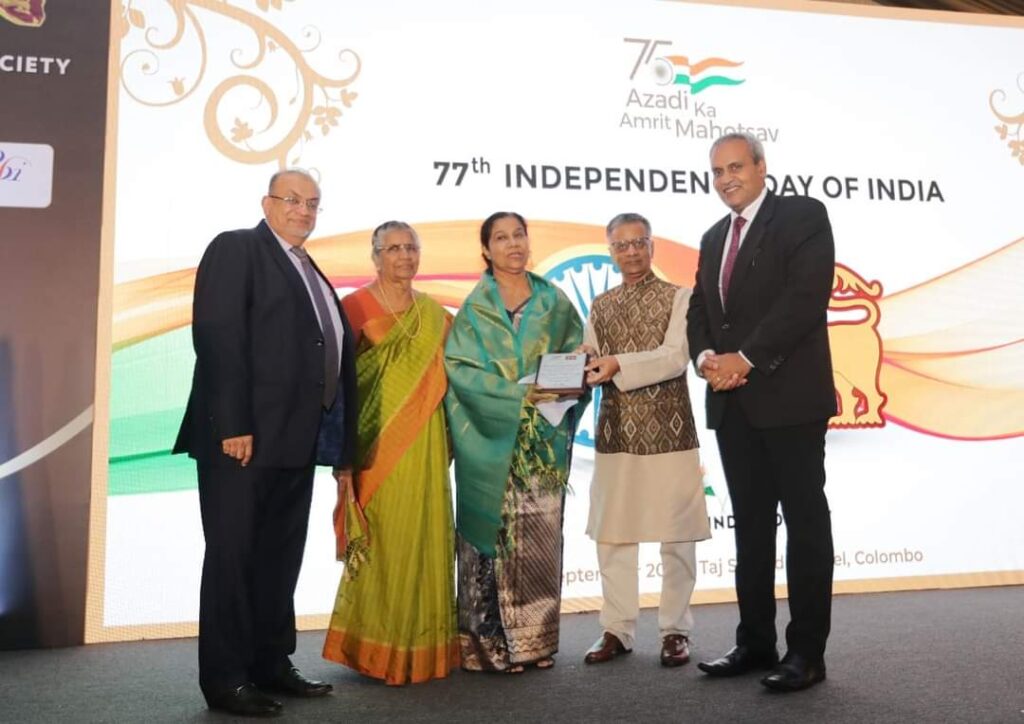
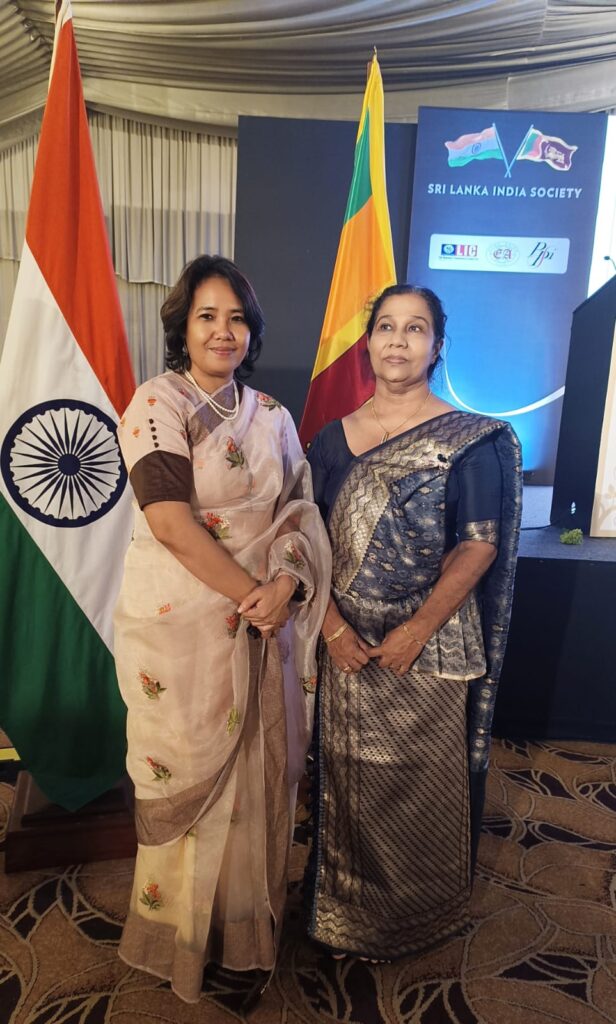
On the occasion of the National Day of Nepal, Director SAARC Cultural Centre, Ms Renuka Ekanayake was invited for dinner hosted by the Ambassador of Nepal H.E. Mr. Bashu Dev Mishra on the 20th September 2023 at Galle Face Hotel. Director, SAARC Cultural Centre extended her heartfelt wishes on the occasion.
(Pic: Director of SAARC Cultural Centre, Ms Renuka Ekanayake, Second Secretary of Nepal Embassy, Mr. Biswash Bhatta and Ms. Diana Perera, Assistant Director, SAARC Division, Ministry of Foreign Affairs, Sri Lanka).
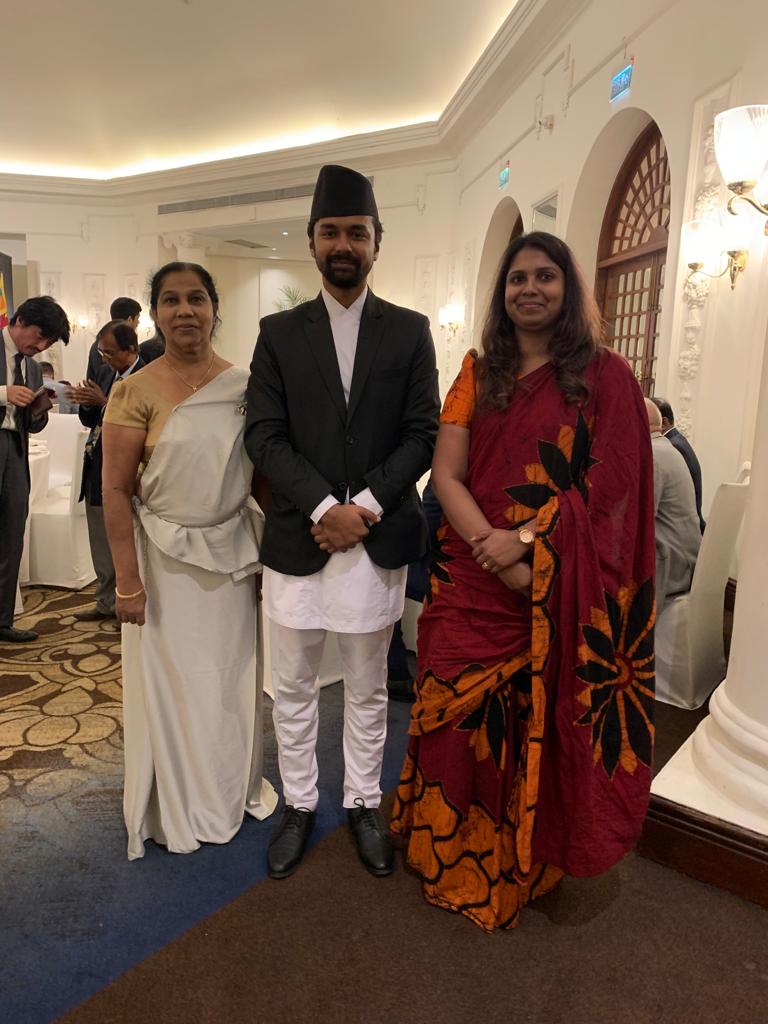
The SAARC Cultural Centre (SCC) in Sri Lanka is an organization that aims to promote cultural ties and foster understanding among the countries of South Asia.
The Fifteenth SAARC Summit held in Colombo in 2008, is the instrumental event that led to the establishment of the SCC Sri Lanka. It was at this meeting that the Heads of State directed that the Agenda for Culture be implemented in full. The SCC in Sri Lanka was established in 2010 as the 11th regional SAARC Centre. The main objectives of the SCC are to promote regional unity through cultural integration and intercultural dialogue and to contribute towards preservation, conservation and protection of South Asia’s cultural heritage within the framework of the SAARC Agenda for Culture.
Since its inception, the SCC has taken up the challenges of achieving its objectives serving as a symbol of South Asian shared cultural heritage. We at the SCC believe that it is not only necessary to preserve our culture and cultural values, but it is equally important to strengthen them through our sustained and coordinated efforts. Over the years, the SCC has developed and implemented various cultural activities through the two main divisions (research and programmes) in the Member States in line with SAARC’s objectives and principles. These activities cover a wide variety of areas such as performing arts, visual/fine arts, archaeology, ancient material culture, musicology, literature, folklore and folk culture, poetry, diminishing arts and related traditions. Through these activities the SCC has been able to inspire and promote different forms of arts in the region, which has resulted in the promotion of cultural and religious tourism in the region.
The framework of the SAARC Agenda for Culture within which the SCC devises long-term strategies towards preservation, conservation and protection of South Asia’s cultural heritage has been successfully implemented and as the Director, I would like to reaffirm the SCC’s commitment in the protection of the region’s distinctive cultural traits. I look forward to promoting cultural exchange and facilitating cross cultural dialogue between nations to contribute to the betterment of the people of South Asia.
The SCC will continue to develop and promote cultural activities and facilities within the region through novel concepts whilst upholding the values of SAARC.
Mrs. D. K. R. Ekanayake
Director
SAARC Cultural Center, Colombo
2023
Applications for the below mentioned position are invited from the Nationals of the SAARC Member States (Afghanistan, Bangladesh, Bhutan, India, Maldives, Nepal, Pakistan, and Sri Lanka) for appointment at the SEC Office, Islamabad, Pakistan.
Deputy Director (Coordination)
General Instructions, Terms of Reference (ToRs) and prescribed Application Form for the above-mentioned position are available on the SEC website (www.saarcenergy.org).
Filled-in Application Form, along with scanned copies of supporting documents/testimonials, should be sent by email to jobs@saarcenergy.org and info@saarcenergy.org. The deadline for submission of Application through email is 28th May 2021.
The public sector applicants are also required to send NOC/approval of their employer through email followed by original NOC through proper channel. Pakistani public sector applicants can send NOC through their employer whereas the public sector applicants from other SAARC Member States shall submit through their respective Foreign/External Affairs Offices. The deadline for submission of NOC is 25th June 2021. Online application and NOC received after the deadlines will not be considered.
Upon selection, the applicant(s) will be required to submit verified and duly attested hard copies of all educational documents/testimonials from the relevant Higher Education Authority and Foreign/ External Affairs Offices. Non-production of such verified and attested copies shall lead to disqualification.
DIRECTOR
SAARC Energy Centre,
H. No. 697, St. No. 43, NPF
Sector E-11/4, Islamabad 44000 – Pakistan
Ph: 051-2228804, Fax: 051-2221937
E-mail: jobs@saarcenergy.org
Website: www.saarcenergy.org
Post : Senior Program Specialist
(Priority Setting & Program Development)
Age : Not more than 55 (Fifty five) years.
Duty Station : Dhaka, Bangladesh
Closing Date : 30th April 2021
Date of Joining : Sixty (60) days from the date of issue of offer letter
Duration : 3 years
Qualification and Experience:
PhD in Agricultural Economics / Economics / Development Studies with 12 years experience or Masters with good academic record in the above disciplines with 15 years experience.
Professional Competence:
Person should be specialized in policy planning, priority setting, program/project evaluation, implementation, monitoring and impact analysis of the program /projects and in report preparation and presentation.
Skills in program monitoring and impact assessment will be an additional qualification.
Brief Job Description:
As a senior member of the division, he/she should be able to perform and initiate programs/activities in the area of policy issues in agriculture and related fields and analyze the impact of those executed programs/activities.
To accomplish the divisional responsibility by building partnership activities in different fields of agriculture including material, knowledge and technology transfer.
Explore to implement the concept of lead country/agency-based program development and leadership in international forum on issues of regional interest.
Ensure timely publication of reports, papers, books, policy brief, any other relevant documents as and when assigned by the competent authority.
Allowances. facilities and benefits:
The sending government shall protect the salary including personal effects. In addition, he/she will and meet the cost of transfer passages for his/her family receive the following allowances from SAC:
| 1. | Living Allowance | US $ 1,225.00 (US Dollar One Thousand Two Hundred Twenty five) only per month (50 % US Dollar & 50 % Taka). |
| 2. | Daily Allowance in lieu of House rent allowance | In the absence of residential accommodation on first arrival, per diem in lieu of house rent allowance @ US Dollar 150. 00 (One hundred and Fifty dollar) per day up to a maximum of 21 days for hotel accommodation. An accompanying spouse and up to two of the dependent children below the age of 21 years will get 50 per cent of Daily Allowance. The daily allowance for professional stuff at SAARC Agriculture Centre, Dhaka, Bangladesh is US Dollar 150.00 (One hundred and Fifty dollar) per day. The Regional Centers shall try to find and finalize lease deed for suitable accommodation within this period of time. In case a suitable accommodation is not available within this period, the actual cost of hotel accommodation will be reimbursed to the professional staff subject to his /her entitled rental ceiling.
(Not applicable for professionals from Bangladesh). |
| 3. | Residential Accommodation | Professional Staff of the Regional Centre’s are presently entitled to unfurnished accommodation within the rental ceiling of US $ 637.00 (US Dollar Six Hundred and Thirty-seven) only in equivalent local currency of Taka per month. |
| 4. | Furniture Grant | The Professional Staff shall be entitled for one time lump-sum furnishing/settlement grant of US $ 2,000.00 (US Dollar Two Thousand) only. |
| 5. | Children’s Education Allowance | Professional Staff shall be entitled to reimbursement of 90% of school Tuition Fees including admission, registration and other compulsory charges subject to an annual ceiling of US$ 1,500.00 per child for a maximum of two children between the age of 5 to 21 years i.e., children up to Grade XII / A-Level on presentation of actual receipt. |
| 6. | Medical Allowance | Professional staff shall be entitled to reimbursement of actual expenses on medical treatment for self, spouse and dependent children subject to an annual ceiling of US $ 1,500.00 including 80% reimbursement of hospitalization charges. No reimbursement shall be made for medicines purchased without doctor’s prescription and on optical frames/glasses/lenses, dental treatments like- dentures, scaling, and surgeries for the purposes of beautification, health care products and health foods. |
| 7. | Home Leave Allowance | Professional Staff shall be entitled to Home Leave Passage for Economy class for self, spouse and two dependent children once in their tenure and only after completing 18 months of continuous service. No daily allowance or any expenditure on account of stop – over and transfer charges from and to airport shall be entitled. |
| 8. | Other(s) | All other entitlements will be born as per SAARC Harmonize rules. |
Common requirements:
General Information:
Preference will be given to persons having work experience in related field as well as in the National Agricultural Research System (NARS)/ Extension service/donor agencies.
Must obtain minimum 2nd class/ division in all stages of academic records.
Age and qualification may be relaxed for highly deserving candidates.
Application in prescribed form (available at the SAARC Division of Foreign / External Affairs, Ministry of SAARC Member Countries and also at the SAC web site: www.sac.org.bd) duly filled in by the applicant with recommendation by the competent authorities should reach to the Director, SAARC Agriculture Centre (SAC), BARC Complex, Farmgate, Dhaka – 1215.
The closing date for receipt of applications (hard/soft copy) at SAARC Agriculture Centre (SAC) shall be 15th April 2021 for advance copy and 30 April 2021 for proper channel copy. The application(s) not received in SAC by the above prescribed closing date(s) shall be summarily rejected, without any notice. A candidate, who anticipates delay in forwarding of his /her application by his/her employer, may send ‘Advance Copy’ of application(s) to the SAC by the said closing date. However, while sending the ‘Advance Copy’ of application(s) directly to the SAC by the closing date, the candidate should append a certificate in his/her advance copy of application indicating clearly therein that he/she has intimated his/her controlling authority/employer of the same and has also simultaneously submitted original application for the said post to his/her controlling authority/employer with a request to forward the same as application “Through Proper Channel” so as to reach SAC office positively within 15 days after the closing date, i.e., by 30 April 2021, otherwise it would be summarily rejected without any notice.
SAARC Cultural Center in Colombo is seeking a highly-skilled, experienced webmaster to develop, update, and operate the official website of the Center with latest lay outs and plug-ins to its current website. The selected person will be responsible for managing the Center’s web/online presence, ensuring that the site is user-friendly, informative and performs as a Resource Center for the entire region and explore new information to the regions beyond. He/ She should also ensure that the website is up to date at all times. The selected candidate will also have to expand its presence through the design and implementation of new web-based applications that will offer a positive impact on the user experience, and highly knowledgeable in server management and online security, content management, and have solid coding skills.
Required Qualifications
Job Description
Other Service Conditions:
Temporary Position for a period of 10 months.
The medium of work will be in English.
Age limit – Not more than 45 years of age on the closing date of applications.
Applicants who possess the above requisite qualifications should forward their applications together with copies of educational/ professional qualifications, details of
work experience and names and addresses of 2 non-related referees.
All applications should be sent by post to reach the address given below on or before 15 July 2020. The post applied for should be stated clearly on the top left hand corner of the
envelope.
Only shortlisted applicants will be called for interviews.
Director
SAARC Cultural Centre
No. 224, Bauddhaloka Mawatha, Colombo 7